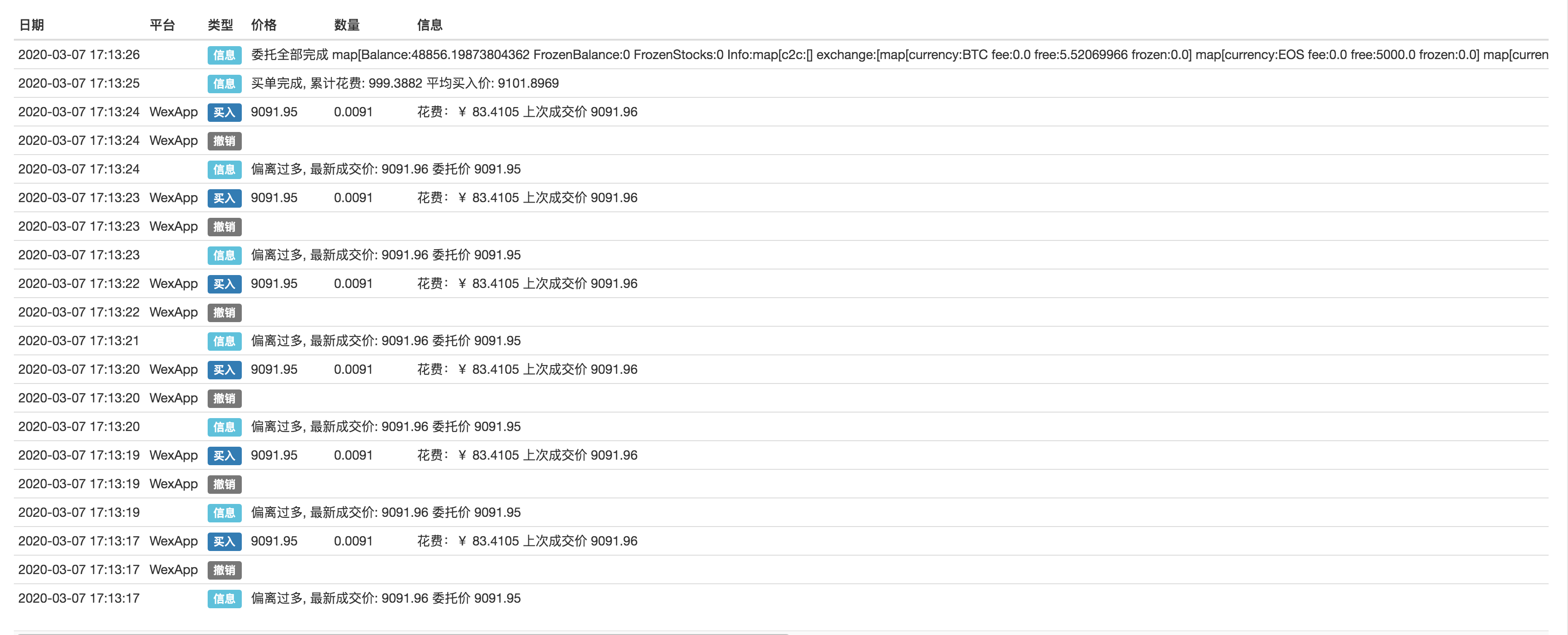Python versión de la estrategia de la comisión iceberg
El autor:La bondad, Creado: 2020-07-21 10:21:10, Actualizado: 2023-10-26 20:08:29
Este artículo trae dos estrategias clásicas para el trasplante: comisión Iceberg (comprar/vender).https://www.fmz.com/square/s:Iceberg/1
Citando la versión JavaScript de la introducción de la estrategia de comercio de comisiones Iceberg:
La comisión Iceberg se refiere al hecho de que cuando los inversores realizan transacciones de gran valor, para evitar un impacto excesivo en el mercado, la comisión de la orden grande se divide automáticamente en múltiples comisiones, basadas en el último precio de compra / venta 1 actual y el precio establecido por el comerciante.
Muchas páginas de comercio de intercambio vienen con herramientas de comisión de iceberg, que tienen funciones ricas, pero si desea personalizar algunas funciones o modificar algunas funciones de acuerdo con sus propias necesidades, necesita una herramienta más flexible. La plataforma FMZ está diseñada para resolver este problema correctamente.
Comisión Iceberg para Python - Compras
import random # Import random number library
def CancelPendingOrders(): # The function of CancelPendingOrders is to cancel all pending orders of the current transaction.
while True: # Loop detection, call GetOrders function to detect the current pending order, if orders is an empty array, that is, len(orders) is equal to 0, indicating that all orders have been cancelled, you can exit the function and call return to exit.
orders = _C(exchange.GetOrders)
if len(orders) == 0 :
return
for j in range(len(orders)): # Traverse the current array of pending orders, and call CancelOrder to cancel the orders one by one.
exchange.CancelOrder(orders[j]["Id"])
if j < len(orders) - 1: # Except for the last order, execute Sleep every time and let the program wait for a while to avoid canceling orders too frequently.
Sleep(Interval)
LastBuyPrice = 0 # Set a global variable to record the the latest buying price.
InitAccount = None # Set a global variable to record the initial account asset information.
def dispatch(): # Main functions of iceberg commission logic
global InitAccount, LastBuyPrice # Reference global variables
account = None # Declare a variable to record the account information obtained in real time for comparison calculation.
ticker = _C(exchange.GetTicker) # Declare a variable to record the latest market quotes.
LogStatus(_D(), "ticker:", ticker) # Output time and latest quotation in the status bar
if LastBuyPrice > 0: # When LastBuyPrice is greater than 0, that is, when the commission has started, the code in the if condition is executed.
if len(_C(exchange.GetOrders)) > 0: # Call the exchange.GetOrders function to get all current pending orders, determine that there are pending orders, and execute the code in the if condition.
if ticker["Last"] > LastBuyPrice and ((ticker["Last"] - LastBuyPrice) / LastBuyPrice) > (2 * (EntrustDepth / 100)): # Detect the degree of deviation, if the condition is triggered, execute the code in the if, and cancel the order.
Log("Too much deviation, the latest transaction price:", ticker["Last"], "Commission price", LastBuyPrice)
CancelPendingOrders()
else :
return True
else : # If there is no pending order, it proves that the order is completely filled.
account = _C(exchange.GetAccount) # Get current account asset information.
Log("The buying order is completed, the cumulative cost:", _N(InitAccount["Balance"] - account["Balance"]), "Average buying price:", _N((InitAccount["Balance"] - account["Balance"]) / (account["Stocks"] - InitAccount["Stocks"]))) # Print transaction information.
LastBuyPrice = 0 # Reset LastBuyPrice to 0
BuyPrice = _N(ticker["Buy"] * (1 - EntrustDepth / 100)) # Calculate the price of pending orders based on current market conditions and parameters.
if BuyPrice > MaxBuyPrice: # Determine whether the maximum price set by the parameter is exceeded
return True
if not account: # If account is null, execute the code in the if statement to retrieve the current asset information and copy it to account
account = _C(exchange.GetAccount)
if (InitAccount["Balance"] - account["Balance"]) >= TotalBuyNet: # Determine whether the total amount of money spent on buying exceeds the parameter setting.
return False
RandomAvgBuyOnce = (AvgBuyOnce * ((100.0 - FloatPoint) / 100.0)) + (((FloatPoint * 2) / 100.0) * AvgBuyOnce * random.random()) # random number 0~1
UsedMoney = min(account["Balance"], RandomAvgBuyOnce, TotalBuyNet - (InitAccount["Balance"] - account["Balance"]))
BuyAmount = _N(UsedMoney / BuyPrice) # Calculate the buying quantity
if BuyAmount < MinStock: # Determine whether the buying quantity is less than the minimum buying quantity limit on the parameter.
return False
LastBuyPrice = BuyPrice # Record the price of this order and assign it to LastBuyPrice
exchange.Buy(BuyPrice, BuyAmount, "spend:¥", _N(UsedMoney), "Last transaction price", ticker["Last"]) # Place orders
return True
def main():
global LoopInterval, InitAccount # Refer to LoopInterval, InitAccount global variables
CancelPendingOrders() # Cancel all pending orders when starting to run
InitAccount = _C(exchange.GetAccount) # Account assets at the beginning of the initial record
Log(InitAccount) # Print initial account information
if InitAccount["Balance"] < TotalBuyNet: # If the initial assets are insufficient, an error will be thrown and the program will stop
raise Exception("Insufficient account balance")
LoopInterval = max(LoopInterval, 1) # Set LoopInterval to at least 1
while dispatch(): # The main loop, the iceberg commission logic function dispatch is called continuously, and the loop stops when the dispatch function returns false.
Sleep(LoopInterval * 1000) # Pause each cycle to control the polling frequency.
Log("委托全部完成", _C(exchange.GetAccount)) # When the loop execution jumps out, the current account asset information is printed.
Comisión del iceberg para Python - Venta
La lógica de la estrategia es la misma que la de la compra, con sólo una ligera diferencia.
import random
def CancelPendingOrders():
while True:
orders = _C(exchange.GetOrders)
if len(orders) == 0:
return
for j in range(len(orders)):
exchange.CancelOrder(orders[j]["Id"])
if j < len(orders) - 1:
Sleep(Interval)
LastSellPrice = 0
InitAccount = None
def dispatch():
global LastSellPrice, InitAccount
account = None
ticker = _C(exchange.GetTicker)
LogStatus(_D(), "ticker:", ticker)
if LastSellPrice > 0:
if len(_C(exchange.GetOrders)) > 0:
if ticker["Last"] < LastSellPrice and ((LastSellPrice - ticker["Last"]) / ticker["Last"]) > (2 * (EntrustDepth / 100)):
Log("Too much deviation, the latest transaction price:", ticker["Last"], "Commission price", LastSellPrice)
CancelPendingOrders()
else :
return True
else :
account = _C(exchange.GetAccount)
Log("The buy order is completed, and the accumulated selling:", _N(InitAccount["Stocks"] - account["Stocks"]), "Average selling price:", _N((account["Balance"] - InitAccount["Balance"]) / (InitAccount["Stocks"] - account["Stocks"])))
LastSellPrice = 0
SellPrice = _N(ticker["Sell"] * (1 + EntrustDepth / 100))
if SellPrice < MinSellPrice:
return True
if not account:
account = _C(exchange.GetAccount)
if (InitAccount["Stocks"] - account["Stocks"]) >= TotalSellStocks:
return False
RandomAvgSellOnce = (AvgSellOnce * ((100.0 - FloatPoint) / 100.0)) + (((FloatPoint * 2) / 100.0) * AvgSellOnce * random.random())
SellAmount = min(TotalSellStocks - (InitAccount["Stocks"] - account["Stocks"]), RandomAvgSellOnce)
if SellAmount < MinStock:
return False
LastSellPrice = SellPrice
exchange.Sell(SellPrice, SellAmount, "Last transaction price", ticker["Last"])
return True
def main():
global InitAccount, LoopInterval
CancelPendingOrders()
InitAccount = _C(exchange.GetAccount)
Log(InitAccount)
if InitAccount["Stocks"] < TotalSellStocks:
raise Exception("Insufficient account currency")
LoopInterval = max(LoopInterval, 1)
while dispatch():
Sleep(LoopInterval)
Log("All commissioned", _C(exchange.GetAccount))
Operación de estrategia
Utilice WexApp para simular la prueba de intercambio:
Comprar:

Venta:

La lógica de la estrategia no es complicada. Cuando la estrategia se ejecuta, colocará y cancelará órdenes dinámicamente en función de los parámetros de la estrategia y el precio actual del mercado. Cuando la cantidad de transacción / número de moneda alcanza o se acerca al número de configuración del parámetro, la estrategia se detiene. El código de la estrategia es muy simple y adecuado para principiantes. Los lectores interesados pueden modificarlo y diseñar una estrategia que se adapte a su estilo de negociación.
- Práctica cuantitativa de los intercambios DEX (2) -- Guía de usuario de hiperlíquidos
- Prácticas de cuantificación en el mercado DEX ((2) -- Guía de uso de Hyperliquid
- Práctica cuantitativa de los intercambios DEX (1) -- Guía de usuario de dYdX v4
- Introducción al arbitraje de lead-lag en criptomonedas (3)
- Prácticas de cuantificación de las bolsas DEX ((1) -- dYdX v4 Guía de uso
- Introducción al conjunto de Lead-Lag en las monedas digitales (3)
- Introducción al arbitraje de lead-lag en criptomonedas (2)
- Introducción al conjunto de Lead-Lag en las monedas digitales (2)
- Discusión sobre la recepción de señales externas de la plataforma FMZ: una solución completa para recibir señales con servicio HTTP incorporado en la estrategia
- Exploración de la recepción de señales externas de la plataforma FMZ: estrategias para una solución completa de recepción de señales de servicios HTTP integrados
- Introducción al arbitraje de lead-lag en criptomonedas (1)
- Añadir un despertador a la estrategia de negociación
- Estrategia de cobertura de contratos de futuros de OKEX mediante el uso de C++
- Estrategia de negociación basada en el flujo activo de fondos
- Utilice el complemento de terminal de negociación para facilitar la negociación manual
- Estrategia de negociación de tasas de tipo cuantitativas
- Estrategia de equilibrio y estrategia de red
- Solución de intercambio de cotizaciones de mercado multi-robot
- Esquema de implementación de mensajes push de robot WeChat
- Estrategias de equilibrio y estrategias de red
- Estrategia de negociación gráfica de Martingale
- La lógica del comercio de futuros de criptomonedas
- Estrategia ZDZB en forma de fondo
- Soluciones compartidas para el mercado de múltiples robots
- Modelado y análisis de la volatilidad de Bitcoin basado en el modelo ARMA-EGARCH
- Solución del problema de precisión del cálculo numérico en el diseño de estrategias JavaScript
- Le enseño a encapsular una estrategia de Python en un archivo local
- El comercio en FMEX desbloquea la optimización óptima del volumen de pedidos Parte 2
- El comercio en FMEX desbloquea la optimización óptima del volumen de pedidos
- Análisis y realización de los futuros de materias primas Gráfico de huella de volumen
- FMEX para desbloquear la orden al mínimo óptimo y optimizar el volumen